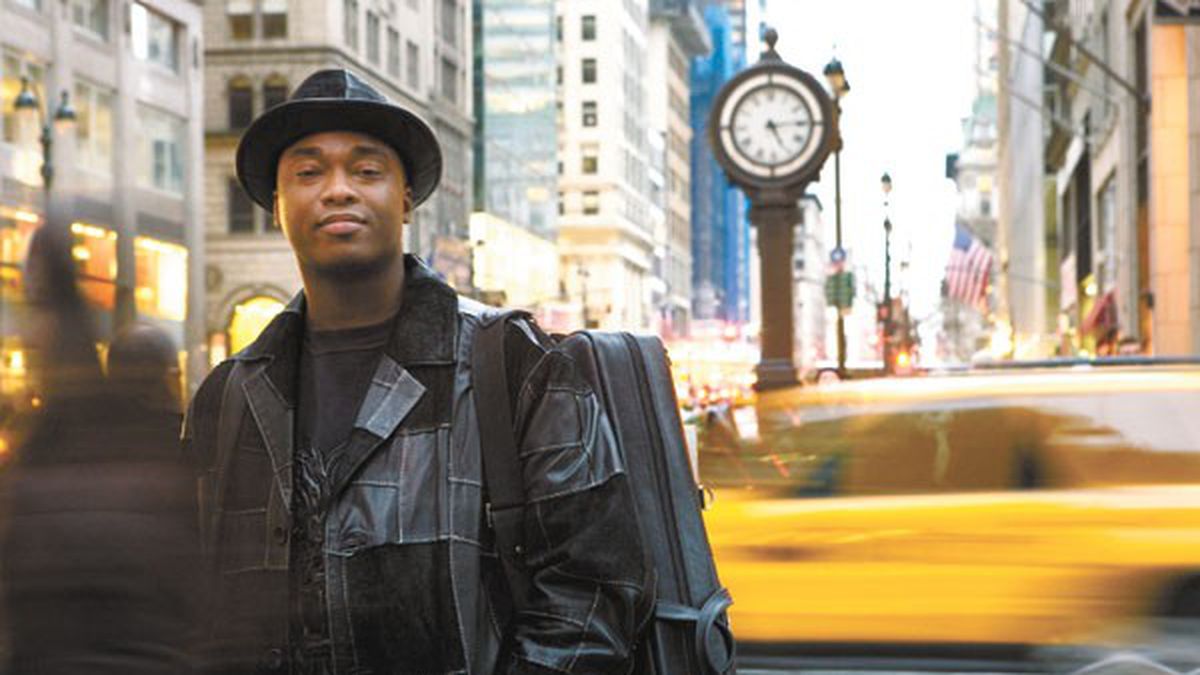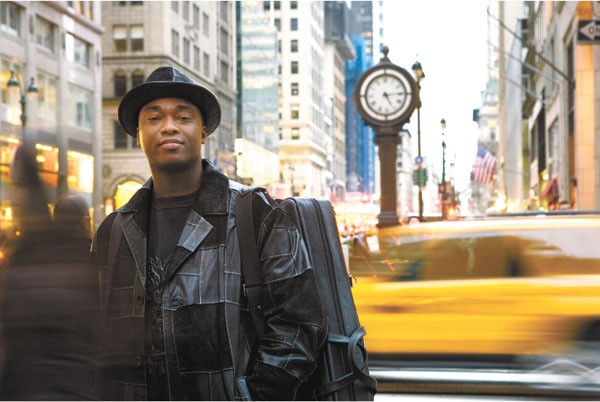James Carter came from a school of New York saxophonists who swung with an abstract pulse and were always pushing ahead of their forebears. And Carter is that way, too. Listen to his albums and you can tell he’s as interested in sounds as in notes. The title track of his 1993 album, JC on the Set, is a deceptively simple funk tune with a powerful saxophone head: Carter rips into his instrument, producing a series of staccato grunts and blues lines that sound smacked out, rather than blown. On that piece, and on his interpretation of the Monk tune “‘Round Midnight,” which kicks off his 1995 album The Real Quiet Storm, Carter showed his ability to hold a single vibrato note for the duration of several bars. He’s a fastidious, sometimes showboaty player who can manhandle his instrument like no other, whether corkscrewing to the end of a phrase or letting a melody devolve into poots and puts — sounds you never thought you’d hear coming from a saxophone.
Carter is, in other words, the type of artist who breaks everything down to its raw components, but always remembers what the original structure looked like. His new album, Present Tense, is adventurous but very considered, meant to represent the jazzman’s current mind-set. For this 39-year-old, the present isn’t always thrusting toward some vaguely defined, “post-modern” future. Unlike most of his peers, Carter is conversant in both straight-ahead and free-form styles. He’s been marketed as a traditionalist and an avant-gardist with no real historical antecedent. Carter is currently fixated on authenticity, and wants to evoke the original sentiment of each tune he plays. His album is largely comprised of standards and old rarities, including tunes by Gigi Gryce and Dodo Marmarosa, who seldom, if ever, appear on current jazz releases. It’s a present tense that’s pushing forward, but in many ways it’s grounded in the past.
The one thing fans seem to agree on is that if Carter had been born fifty years earlier, he could have easily been as influential as Lester Young or Coleman Hawkins. Born in Detroit, he was the youngest of five children, and grew up surrounded by music. “My mom used to play violin and piano in her formative years. My dad just played a mean radio — wouldn’t like nothing but B.B. King and T-Bone Walker,” the saxophonist recalled in a recent phone interview. Carter came to music at age ten, starting on the baroque recorder. “It was a nice way of weeding out individuals who weren’t willing to play instruments — an inexpensive way too,” he said, adding that at that time, recorders ran for about $2.50 a pop. But Carter was a quick study, and by age sixteen he was gigging around the Detroit area. He befriended avant-garde trumpeter Lester Bowie and became a sub for Wynton Marsalis’ band when Branford left to tour with Sting. “I’d do extended weekends and be back in time for Monday, so I didn’t record or anything,” he said. By the time Carter moved to New York in 1990, he was already a heavyweight.
“When he first came on the scene, his virtuosity made me want to strangle him, because I’m a failed tenor player,” said jazz record producer Michael Cuscuna, who collaborated with Carter on Present Tense. “He’s one of those people … who, their brain tape-records everything they hear — it’s like total recall.” JC on the Set had quite an amazing sweep, covering everyone from Don Byas — the Muskogee-born tenor player who helped popularize bebop styles of phrasing in the 1940s — to Sun Ra. Carter could play a tune straight if he wanted to, but he became known for inventive forms of pitch and intonation. Reinterpreting old classics like “Worried and Blue” or Byas’ “1944 Stomp,” he would apply his whole personality and rigorous imagination to the texture and surface quality of the song. He’s perhaps the only composer who could justify a love ballad called “Deep Throat Blues.”
In the course of two decades Carter dropped more than a dozen records as a leader, including tributes to Django Reinhardt and Billie Holiday. He played with World Saxophone Quartet members David Murray and Julius Hemphill, as well as Frank Lowe, the Charles Mingus Big Band, and Lincoln Center Jazz Orchestra, to name a few. More importantly, he mastered just about every instrument in the woodwind family: A typical live performance might feature Carter on soprano, baritone, and tenor saxes, as well as the flute and bass clarinet. About a year ago he and Roger Glenn played a mean duet at Yoshi’s in Oakland, using just the head pieces of two flutes (the average musician can get a single tone by blowing across the head piece, but Carter figured out a way to produce a whole range of sounds).
Present Tense is Carter’s most compelling album in years, considering its selection of material. Coming up with the song list was a collaborative process, said Cuscuna, who helped Carter choose tunes that would show off his stylistic range and whole arsenal of reeds. The album kicks off with “Rapid Shave,” a tune poached from Shirley Scott’s 1964 live album Queen of the Organ. (“It’s such a smokin’ tune, and I’ve always wondered why no one ever covers it,” said Cuscuna.) Other resurrected gems include “Shadowy Sands,” a bossa that Jimmy Jones originally wrote for bass clarinetist Harry Carney, and the Victor Young tune “Song of Delilah,” which Carter altered to get more of a funk feel. The highlight is an Eric Dolphy tribute (“Bro. Dolphy”) that’s actually three tunes compressed into one: It starts with a bustling bass clarinet head, then shifts to a ballad section that’s sexy in a real old-fashioned, pork-pie-hat kinda way. By the end, it’s a completely different tune, switching to a more abstract form that has Carter and trumpeter Dwight Adams swirling around each other as though jockeying for position. It’s like visiting some nostalgic space of innocence and then being jolted straight to the present, in about seven minutes.
Which says a lot about James Carter’s creative process. He’s the guy in the fedora and the crisp pinstripe suit who genuflects to his forebears but also adulterates them — a guy who resides in the present but could also be a visitor from the past. These days Carter is fascinated with original lyrics, and it seems to have something to do with finding the intention behind everything he plays. He believes that part of a song’s integrity lies in its history, and in what previous masters brought to it. Modern music is about freeing things up, he says, and “being able to emote whatever the feelings are that you have about life.” But you can’t get to the present tense without knowing where it came from.













